| Srl | Item |
| 1 |
ID:
123821


|
|
|
| 2 |
ID:
109713
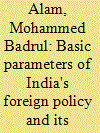

|
|
|
| 3 |
ID:
096336
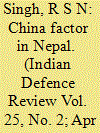

|
|
|
| 4 |
ID:
119138
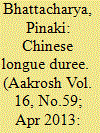

|
|
|
| 5 |
ID:
038756
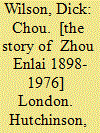

|
|
|
|
|
| Publication |
London, Hutchinson, 1984.
|
| Description |
349p.Hbk
|
| Standard Number |
0091543401
|
|
|
|
|
|
|
|
|
|
|
|
Copies: C:1/I:0,R:0,Q:0
Circulation
| Accession# | Call# | Current Location | Status | Policy | Location |
| 024808 | 923.251/WIL 024808 | Main | On Shelf | General | |
|
|
|
|
| 6 |
ID:
131777
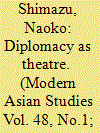

|
|
|
|
|
| Publication |
2014.
|
| Summary/Abstract |
As a significant 'moment' in twentieth-century international diplomacy, the rise of post-colonial Afro-Asia at the Bandung Conference of 1955 is replete with symbolic meanings. This paper proposes a conceptual approach to understanding the symbolic dimension of international diplomacy, and does so by ruminating on the newly unearthed Indonesian material on the Bandung Conference. To this end, 'diplomacy as theatre' is introduced as an interpretive framework to re-cast the conference as a theatrical performance, in which actors performed on the stage to audiences. Focusing on the city of Bandung, this paper reconstructs some examples of the 'performative' dimensions of international diplomacy, and elaborates on the notion of 'staging' the city and the role played by the people of Bandung, including the significance of conference venues, as well as the impromptu creation of a ritual citation that contributed to an iconic 'performative act' during the conference. Sukarno, Nehru, Zhou Enlai and Nasser all understood the importance as performers in their role as new international statesmen, representing the esprit de corps of the newly emergent post-colonial world. In deconstructing the symbolic, it will become evident that the role played by Indonesia significantly influenced the underlying script of the diplomatic theatre which unfolded at Bandung.
|
|
|
|
|
|
|
|
|
|
|
|
|
|
|
|
| 7 |
ID:
114765
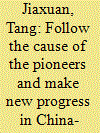

|
|
|
| 8 |
ID:
161498
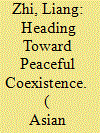

|
|
|
|
|
| Summary/Abstract |
Since coming to power in Myanmar, the National League for Democracy (NLD) has unambiguously indicated that it will carry out Burma's foreign policy as it was established during the country's foundation (i.e., an “independent, active and nonaligned foreign policy”). Retrospectively, we can trace the historical precedents of the NLD's foreign policy to Burma's foreign policy in the period of the Korean War in 1953. Using Burmese, Chinese, Indian, and US official documentation, and following an international history approach, I explore the background, process, and effects of Sino-Burmese relations in the period of 1953 to 1955 as an entirety. Thus, in this article I offer important historical insights to contemporary Burmese foreign relations.
|
|
|
|
|
|
|
|
|
|
|
|
|
|
|
|
| 9 |
ID:
106363
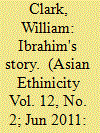

|
|
|
|
|
| Publication |
2011.
|
| Summary/Abstract |
The article details the personal and professional life of Ibrahim Muti'i (1920-2010), a well-known Uighur linguist. Through a series of interviews, Mr. Muti'i sketched the events he wanted to be remembered. Mr. Muti'i's life story corresponds with many of the significant events in Northwest China both in the Republican era (1911-1949) and the first decades of the People's Republic of China era.
|
|
|
|
|
|
|
|
|
|
|
|
|
|
|
|
| 10 |
ID:
145660
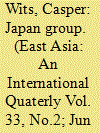

|
|
|
|
|
| Summary/Abstract |
In the new Cold War context of the early 1950s, when the People’s Republic of China and Japan had no official relations, Chinese Premier Zhou Enlai developed his so called People’s Diplomacy; a strategy of creating informal channels between China and Japan that could serve to build a network of personal ties outside the immediate government sphere, ties that would ideally become so strong they would result in official diplomatic relations. A central position in this strategy was reserved for the Japan Group; an unofficial network drawn from different foreign policy organs, centered on Zhou Enlai’s close confidant Liao Chengzhi, which was to manage Zhou’s Japan policy. This group, many of whom had a background in intelligence work, was charged with training the Chinese government’s Japan specialists, managing all interactions with Japanese, as well as with actively cultivating ties with a wide variety of Japanese, especially outside of Japanese leftist circles. This article traces the establishment and inner workings of the Japan Group in the 1950s, based on published records of, and interviews with, group members. The main focus is on the core of the group, made up of a small number of trusted Japan hands around Liao Chengzhi. Since this same core group of people was involved in all interaction with Japanese, they provided the continuity necessary for cultivating the informal personal ties that had to lead to the long-term goal of Sino-Japanese rapprochement. This networking process, which transcended the immediate concerns of particular negotiations and exchanges, will also be explored.
|
|
|
|
|
|
|
|
|
|
|
|
|
|
|
|
| 11 |
ID:
173861
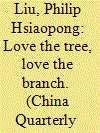

|
|
|
|
|
| Summary/Abstract |
Chinese national identity has long been considered to have been an obstacle to Singapore's nation-building efforts. This is mainly because China was suspected of using its ethnic links to encourage Singapore's communist rebellions during the 1950s and 1960s as Lee Kuan Yew was working towards establishing the city state. This study reviews Lee's exchanges with Beijing and argues that he gave China the impression that he was building an anticolonial, pro-China nation. Beijing therefore responded positively to Lee's requests for support. Reiterating its overseas Chinese policy to Lee, Beijing sided with him against his political rivals and even acquiesced in his suppression of Chinese-speaking “communists.” In addition, China boosted Lee's position against Tunku Abdul Rahman, supported Singapore's independence and lobbied Indonesia to recognize the territory as a separate state. China thus actually played a helpful role in Singapore's nation building.
|
|
|
|
|
|
|
|
|
|
|
|
|
|
|
|
| 12 |
ID:
106873
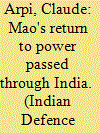

|
|
|
| 13 |
ID:
128494
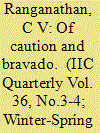

|
|
|
| 14 |
ID:
129871


|
|
|
| 15 |
ID:
102326
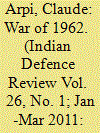

|
|
|
| 16 |
ID:
110139
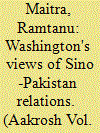

|
|
|